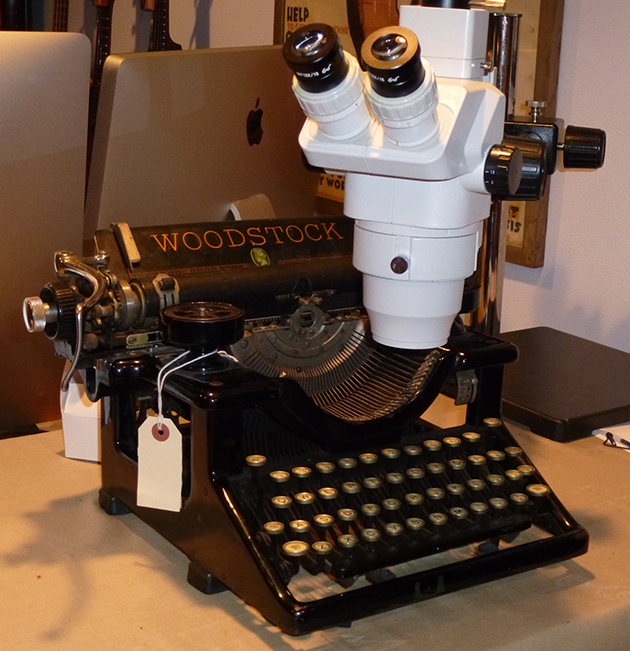Alger Hiss’s typewriter is sitting on a table in my husband’s home office. Since we unpacked it from a large wooden crate a few days ago, I’ve repeatedly run my fingers over its keys and traced the letters that read “Woodstock” on its backplate. I tried typing on the very same keys that Hiss’s wife, Priscilla, allegedly used to copy classified government documents, but the type bars tangled together.
Why is American history’s most infamous typewriter in our modest house? It began when I fell for a historian.
Jeff and I met online, flirting through email and phone calls. On our first date, after we’d greeted each other on the steps of the Barnes & Noble near Union Square, we wandered around the Village, talking. We’d barely known each other 10 minutes, when Jeff asked, “What do you think of the Hiss case?” I couldn’t tell if he was joking. Astonished, I mumbled something, and apparently it was the correct answer because after that day Jeff—and Alger Hiss—became part of my life.
Jeff was six when he heard about the case on an Edward R. Murrow recording, I Can Hear It Now. Later, when he was in college in the 1970s, he researched the trials for an independent study project. Feeling Hiss had been wronged, and with the hubris of a 21-year-old, Jeff wrote him a letter, volunteering to help in his efforts to overturn the guilty verdict that had sent Hiss to jail for perjury in 1950.
The Hiss case involved allegations of a Communist spy ring, stolen government documents, and film hidden in a pumpkin. The trials captivated the country.
The leading characters in the Hiss case could not have been more different. Tall and patrician, Alger Hiss was a graduate of Harvard Law School and a clerk for Supreme Court Justice Oliver Wendell Holmes. In 1933, he joined the New Deal. Twelve years later, he was the Secretary General of the San Francisco conference where the United Nations was founded.
Short and round, and famous for his bad teeth, Whittaker Chambers was a brilliant writer who was expelled from Columbia University for publishing a blasphemous short play in the school literary magazine, and then fired from his job at the New York Public Library for stealing books. In the mid-1920s he joined the Communist Party and claimed to have been a member of the secret Communist underground during the 1930s. In 1948, he testified before the House Un-American Activities Committee that one of his cohorts had been Alger Hiss. Hiss denied it and sued Chambers for libel. During pretrial depositions, Chambers changed his accusations and now said that he and Hiss were spies. He produced a set of documents—typed copies of State Dept. documents he claimed Hiss’s wife had typed on the family typewriter and given to Chambers for transmission to the Soviet Union.
Because the statute of limitations had run its course, Hiss could not be charged with espionage, so when he denied the allegations again before a grand jury, he was indicted for perjury. The first trial ended with a hung jury, but in January 1950 he was convicted and served 44 months in prison.
At his sentencing, Hiss said, “I am confident that in the future the full facts of how Whittaker Chambers was able to carry out forgery by typewriter will be disclosed.”
Jeff worked for Hiss for a few years before entering graduate school and a career in journalism. Through the years Jeff has had other jobs and written books on other subjects, but his passion for the Hiss case remained. Hiss died in 1996, and a couple of years later Jeff returned to the case full-time, now working with Alger’s son Tony. Despite Jeff’s dedication to the Hiss case, he made time for a personal life (thank goodness).
Jeff and I married in 2005. During our vows Jeff clasped my hands in his, smiled, and said, “When you’re in love, the air smells sweeter, the colors are brighter, and even the Mets play better. And I’m so glad you answered the Alger Hiss question correctly.” We moved to a small house in the country: Jeff, me, my daughter Lizzie, and Hiss’s ethereal presence. After the moving men had unloaded pyramids of boxes from our two homes, we began the long process of unpacking, stashing dishes in the kitchen cabinets, books on the shelves, and dozens of Woodstock typewriters and cartons of FBI files in our basement.
I began to see absurd poetry in redacted files, many of which had been almost completely blacked out. I learned which agents were atrocious spellers.
We quickly adapted to our new life together. “It’s for you,” I’d inform Jeff when the phone would ring and “U.S. GOVERNMENT” appeared on the caller ID. The FBI’s constant phone calls soon became as novel as those from telemarketers. When Jeff sued the FBI under the Freedom of Information Act to acquire previously unreleased documents as the basis for his next book, I delightedly posted a screenshot of the Google search entry on Facebook. (How could you not love an entry that read: “Kisseloff v. Federal Bureau of Investigation?”) When Jeff won the lawsuit I updated the screenshot: “Jeff 1, FBI 0.”
Over the years I didn’t think it was odd that my husband would occasionally check to see if he had an FBI file—or that he was disappointed when he learned he didn’t. I stopped fearing I’d accidentally recycle a pile of FBI files Jeff had left on the kitchen table, and I quit worrying when I set my coffee cup on one and left a ring. I began to see absurd poetry in redacted files, many of which had been almost completely blacked out. I learned which agents were atrocious spellers.
I also grew fond of our growing collection of typewriters, all of them the same make and vintage of the Woodstock at the center of Hiss’s trials. I loved that each machine’s type is a mechanical fingerprint, and no two machines’ prints are exactly the same, a fact brought out at his trials when the government claimed that some of the secret documents Hiss handed over to Whittaker Chambers were typed on Hiss’s Woodstock.
Occasionally it seems like Alger is a bit like a kindly invisible uncle to Lizzie. She certainly knows far more about him than the average child. By five, she knew pumpkins can be used for more than Halloween jack-o’-lanterns or Thanksgiving pie—that film could be hidden in them. And as Lizzie grew, so too did her knowledge of the Hiss case. “Is that station named after Whittaker?” she asked at nine, as the No. 1 train pulled into Chambers Street. During the last presidential election, when she was 13 and yet another Republican lobbed the “communist” and/or “socialist” label at President Obama, she said, “Wow, this is just like the Hiss time.”
And I’ve learned “the Hiss time” still brings up plenty of strong feelings today. A (now ex-) friend of mine went after my husband on Facebook, hurling personal insults at him before declaring Alger a “wretched old traitor.” Jeff occasionally gets hate email, calling him a “commie fink,” “pinko idiot,” or worse.
“Where there’s obsession, a marriage will never last—you’ll always be second to his work,” a tall, well-dressed woman writer in her sixties brusquely informed me at a party that Jeff and I attended. I clutched my empty wine glass, forced a smile, and told her she was wrong. She tartly assured me she knew from experience. Jeff, sensing I was perplexed, came over and wrapped his arm around me. I grabbed his hand and squeezed it. The stranger couldn’t be right. Why had she seemed so angry? Had her own relationship detonated over a fixation? Maybe she was writing a book about Whittaker Chambers.
That’s not to say living with two men isn’t sometimes trying. Late one afternoon, while Jeff and I worked at home, we got into one of those silly arguments that quickly metastasizes into something larger. I can’t remember how it started—the selective amnesia of a fight that begins so innocuously it’s impossible to remember what it was about: an unmade bed, an unwiped counter, an unsaid word. Whatever it was, it quickly spiraled out of control. I wanted to hurt Jeff.
“The Hiss case is stupid!” I screamed.
He looked at me, amazed. He laughed. I started giggling, and neither of us could stop for some time. It’s difficult to continue fighting over a dead man. I don’t think Alger saved our marriage, but he certainly saved the afternoon.
And Alger Hiss’s typewriter? I think it’ll be our last one. After 35 years, Jeff says he’s solved the case and that the huge digital microscopes that surround the typewriter will clinch it. I’m already trying to figure out what we can do with all the extra space. In the meantime, the typewriter already has its own fan club. Friends have come over to see it and have their photos taken with it. Even the Woodstock seems to know something is up. In fact, it appears to be smiling.




